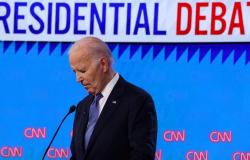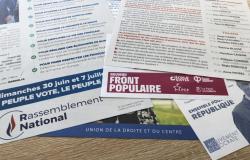As trade tensions between China and the EU continue to grow – with Brussels having declared its readiness to impose customs duties on Chinese vehicles in the event of proven dumping and Beijing having threatened retaliation – some are calling for a negotiation to to avoid a trade war.
The European Commission launched an investigation last September into Chinese electric vehicles, which it suspects of having benefited from subsidies creating a distorting effect on the global market.
At the end of its investigation, it could impose customs duties on all imports of Chinese electric vehicles.
In a letter sent to the European Commissioner for Trade, Valdis Dombrovskis, whose existence Euractiv discovered a few days ago, the Chinese Ministry of Commerce threatened to retaliate by hitting the agriculture and aviation sectors of The union.
Experts expect the EU executive to present the findings of its investigation and announce preliminary measures as early as June 10, the day after the elections. From November 2024, higher customs barriers could be implemented.
According to David Kleimann, international trade expert at the ODI, a think tank specialized in geopolitics, the announcement of provisional customs duties could be considered as ” a starting point “ for negotiations between the two parties.
As a result, entry barriers would be lower than the levels recommended following the investigation, if Chinese and European officials can reach an agreement.
“The four-month period between July and November during which the provisional duties would apply provides an ideal opportunity for China, the EU, Member States and affected producers to begin discussions and negotiations on possible alternatives » to a trade war, he explained.
Mr Kleimann added that negotiations had already started, with China having communicated its demands and red lines to the Commission.
Germany, through its Minister of Transport Volker Wissing, has already made it known that customs duties were not a good approach, and that an amicable agreement would be favored.
The approach must “always be about creating fair competition instead of trying to hinder it”specified the minister.
Threats and reprisals
German automakers are particularly concerned about restrictions that could affect their operations in China, the world’s largest auto market.
For John Clarke, former head of international affairs at the Commission, China’s choice to target agriculture in retaliation is hardly surprising given the highly sensitive nature of the sector.
“Agriculture unfortunately tends to be the first and easiest victim”, he emphasizes. The sector is also at the heart of all political and electoral attention in many Member States.
Conversely, the Asian giant’s threats to hit Airbus, headquartered in the Netherlands, with sanctions is “a more interesting choice“, explains Mr. Clarke.
“China needs Airbus right now because [son concurrent américain] Boeing is considered dangerous. On the other hand, China could benefit from [la suspension de l’accès d’Airbus à son marché] to accelerate its own air transport sector.
“Any negotiations should logically take place after a decision on provisional rights in order to maximize leverage”concludes the former international civil servant.
Trading Outlook
Niclas Poitiers, expert on trade policy issues within the think tank Bruegel believes that “from a European point of view, it is preferable to dialogue with Beijing, and resolve this question of subsidies in a concerted manner.”
But he qualifies: “I don’t think that’s possible.” He cites as proof the complex nature of the subsidies granted by the Chinese government: if sometimes the State invests directly in a company, it can also support a sector through preferential access to bank loans, a practice that is much more opaque and complicated to control.
The same goes for preferential access to cheap land for the creation of factories, or the rigged award of public contracts.
So many different types of financing which do not necessarily comply with the rules of the World Trade Organization (WTO) and which would raise new complex legal questions, explains the researcher.
The US government recently increased its tariffs on Chinese electric cars from 25% to 100%, which experts say violates WTO rules.
“The key question is whether the interim tariff rate will be enough of an incentive for China to come to the negotiating table”summarizes David Kleimann.

[Édité par Théo Bourgery-Gonse & Anne-Sophie Gayet]








